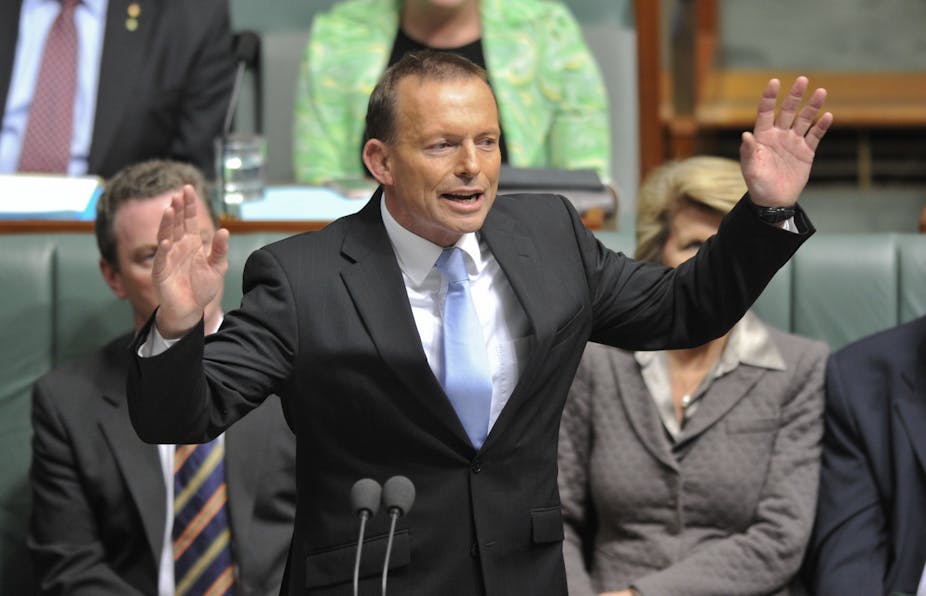Opposition leader Tony Abbott’s comments in the Sydney Morning Herald and The Australian newspapers point to a shift in Coalition trade policy that would give Japan higher priority over China.
So why would Australia, given that China is a much larger trading partner, move its focus to Japan?
There are so many inconsistencies in these comments that it’s hard to know where to start.
Firstly let’s look at the fundamental tenet of international trade theory, as taught in first-year introductory microeconomics courses in universities world wide.
Imagine a two-country world in which each country produces two goods in competitive markets. In competitive markets, free trade is welfare-improving for both countries, compared with the situation in which tariffs and other non-tariff barriers are imposed on trade.
Free trade means there will be winners in each country – namely, the producers of those goods in which each country has a comparative advantage, as well as consumers. The gains to these winners will outweigh the losses to the losers – namely, the producers of those goods in which each country has a comparative disadvantage.
It’s that simple.
Of course, we don’t live in a two-country world and each country produces many more than just two goods, some in markets that are competitive and some that are less so.
Yet this fundamental tenet is still very solid, and has been one of the cornerstones of orthodox Liberal (and small “l” liberal) principles throughout time: free trade is welfare improving for nations on the whole.
It is not clear whether this principle was in the back of Abbott’s mind. He has made comments that seem to imply an understanding that free trade is a good thing.
Unfortunately, Abbott undermines his economic credentials in this comment: “I am all in favour of freer trade with Japan. I am all in favour of freer trade with China, provided it’s in Australia’s national interest.”
Since the whole point of the free trade argument is that freer trade is in Australia’s national interest, no proviso is required.
Even if we try to give Abbott the benefit of the doubt that he does believe free trade to be in Australia’s national interest, it remains very difficult to reconcile this with the simultaneous signal that he will favour Japan over China if the Coalition wins the next election.

In particular, Abbott claims Japan’s market economy and democratic system of government are “advantageous in any serious person’s view”, and this is one of the reasons why Australia’s free trade agreement with Japan should be given higher priority than the one with China.
To be fair, Abbott did confirm in The Australian that he was just making “the obvious point that it’s probably going to be easier to conclude a free trade agreement with a fellow market economy and a fellow liberal democracy”.
Indeed, the stalled progress on both negotiations, alongside decades of trying, and failing, to get Europeans to open up their agricultural markets, suggests that politicians world-wide struggle to live up to their principles, no matter what kind of system they govern in.
More critically, consider the lack of logic in favouring a free trade agreement with Japan over one with China – that is, “freer trade” with Japan over “freer trade” with China.
According to the recent economic indicators for China and Japan provided by Department of Foreign Affairs and Trade, China has recorded average annual real GDP growth of 10.9% since 2006.
Compare this with just 0.07% for Japan, which, unfortunately, recorded negative growth in three of these years, if projections for 2011 are included.
In 2010-11 Australia’s merchandise exports to China reached $65 billion, compared with $47 billion to Japan. Imports from the two countries were $41 billion and $17 billion respectively.
Our major export to China (iron ore and concentrates) was valued at $40 billion compared with coal, our major export to Japan, valued at $15 billion.
Our three major imports from China – clothing, telecom equipment and parts, and computers – were valued at $12 billion, compared with $8 billion worth of imports of passenger vehicles, refined petroleum and goods vehicles from Japan.
This combination of facts demonstrates clearly and simply that both trading relationships matter greatly, but one is bigger, stronger, and growing more rapidly. And it’s not the one with Japan.
So in the pursuit of national self-interest, ruthless or otherwise, why on earth would a believer in the benefits of free trade push first for a deal that would be almost guaranteed to bring fewer aggregate benefits?
The answer, of course, lies in politics, not economics. The politics is that of trying to appease Australia’s waning manufacturing sector – a sector in which, in a broad sense, we lack comparative advantage.
Stalling on the trade agreement with China may make some sense to Abbott, despite the unnecessary tension it will undoubtedly cause in Beijing.
But for the rest of us, it should not be that surprising that The Australian newspaper ran the headline that “Abbott’s China policy would baffle Howard”.
It should be baffling to just about anyone.

